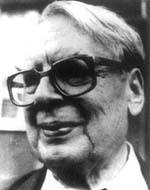Errors
Boris Gnedenko
Thinking the WorstThere is a pervasive problem in quantitative ethics. It is that the human psyche hates to be found to have been wrong in an expectation of good. It does not mind so much being found wrong in an expectation of evil. Thinking the worst of things counts as a sign of worldliness and street smartness. Thus it is that good experiences tend not to cumulate, whereas a single bad one may persist shatteringly in memory.
Edmond Gosse tells how his youthful charity to some ungrateful peasants destroyed his capacity for charity forever. He had brought some carefully saved coins to present to one of the poor families of a nearby village, probably expecting a word of thanks:
When I reached the cottage, husband and wife were at home, doing nothing at all in the approved Sunday style. I was received by them with some surprise, but I quickly explained my mission, and produced my linen bag. To my disgust, all John Brooks said was, "I know'd the Lord would provide," and after emptying my little bag into the palm of an enormous hand, he swept the contents into his trousers pocket and slapped his thigh. He said not one single word of thanks or appreciation. I was absolutely cut to the heart . . . the springs of benevolence were dried up within me, and to this day I have never entirely recovered from the shock of John Brooks's coarse leer and his "I know'd the Lord would provide." The infant plant of philanthropy was burned in my bosom as if by quick-lime.
Such stories might be multiplied indefinitely. Their cumulative advice is that you are safer - psychologically safer - if you think ill of your fellow beings. Hobbes with his jungle world is there to back you up. The economists have their rapacious Economic Man model to keep you company. The famous if refutable puzzle of the Prisoner's Dilemma fascinated two generations of the social scientistically inclined, with its assumptions of treasonable behavior. Plenty of bad stuff does indeed exist. But the fact of its existence need not be exalted as a universal fact, or as a rule of life. Still less can it be made a canon of historical interpretation. And why not? Because there also remains the other side of things. In witness whereof, we may briefly cite the case of Boris Gnedenko. The following two paragraphs are copied from Tales of Statisticians:
The problems of reliability in textile machinery, together with visiting seminars led by Moscow professors Kolmogorov and Khinchin, led to Gnedenko's first publications in queuing theory (1933). In 1934 he entered Moscow State University, working at first under Khinchin, later under Kolmogorov. The problem he attacked was the limiting behavior of sums of independent random variables, when the number of terms grows without limit. After obtaining his PhD in 1937 for an original solution of this problem, he became a research assistant in the University's Mathematics Institute.
Then came the incident for which Gnedenko is now famous. On a hiking trip to the Caucasus with Institute colleagues that summer, he let it be known in conversation that he was not enthusiastic about Soviet policies. Gnedenko was drafted into the army on 1 December. Four days later he was arrested by the KGB; he had been denounced by one of his companions on the hiking trip. He was imprisoned in intolerably crowded conditions, interrogated daily, and offered his release if he cooperated by identifying his teacher Kolmogorov as the leader of a group of "enemies of the people" in the Mathematics Institute. After six months of this, having steadfastly refused to even consider the possibility of complying, he was released with a "black mark" on his record. With support from Kolmogorov and Khinchin, he was eventually able to resume his position as a research assistant, in 1938.
Just that. Thought you'd like to know. Know what, exactly? That calculations assuming the worst of people may be as much off as the other kind. Attention to individual cases is required.
Postscript 2006: It seems hardly fair to have the Gnedenko profile in Tales of Statisticians point a sharper historical moral than the present page. Here, then, is the end of that profile:
Gnedenko outlived the Soviet system. He also outlived his generation. He died in 1995, the last survivor of the great group of Russian Probabilists (Chebyshev, Markov, Lyapunov, Bernstein, Khinchin, Kolmogorov, and Linnik). Until almost the day of his death, though ill and nearly blind, he continued to be mathematically active. Among other things, in his last years he organized a Department of Actuarial Mathematics at Moscow University.
His obituary by Vatutin et al (tr Theory of Probability and Applications, v41 [1997] #2) mentions, as something previously known only to a few close friends, his principled behavior under Sovietism. It deserves to be remembered as a practical refutation of the cynical econometrist theories embodied in such supposed behavioral models as the Prisoner's Dilemma. We have accordingly designated principled human conduct as the G or Gnedenko Factor, and expect that future computations about humanity, including humanity under pressure, will allow for that factor.
Others will of course aim to destroy it; here is one of the great themes of human history.
15 June 2004 / Contact The Project / Exit to History Page
